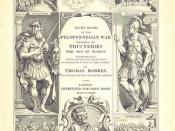Class discussion on Wednesday, September 11 centered around Thomas Hobbes and the thirteenth and fourteenth chapters of his book, Leviathan. Written in 1651, this book seems to present a rough sketch of governmental needs for people based upon the somewhat philosophical views of nature and it's purpose. Based upon the readings, I alone suggested that Hobbes did not support absolutism. After the class discussion, I have changed from being certain that he was not in support of absolutism to being uncertain of his position for government in general.
The view that Hobbes held for human nature wasn't necessarily "survival of the fittest." Rather, Hobbes seems to have allowed for conflicts between men with the understanding that these men were governed by individual reasoning that relies on glory, diffidence, and even competition. Furthermore, he noted that all men are equal, and it is this equality that drives men to such aforementioned conflicts: men desire the same things, cannot each have these things, and therefore become enemies, fighting over these things.
To spite these conflicts, Hobbes suggested that there were certain laws that naturally existed and should, therefore, govern society. He argues that the natural drive of competition, diffidence, and glory for men are no sins because they existed before laws. Furthermore, Hobbes suggests that actions driven by these forces could not be considered sins because the individual did not know the law, could not know the law until it had been created, and could not create the law without agreeing upon the set up of the law. Eventually, Hobbes goes back to says that there are, nonetheless, a few laws that exist naturally. First, Hobbes says that each man should live for himself, answering to himself, and tending to himself. This law would allow for liberty and freedom for individuals...


